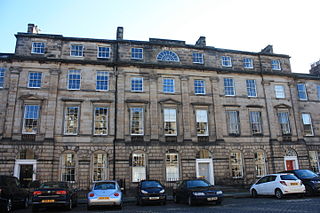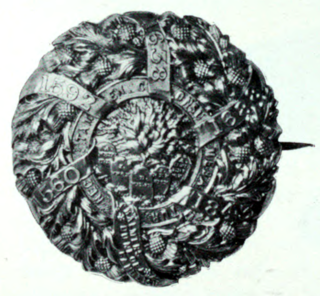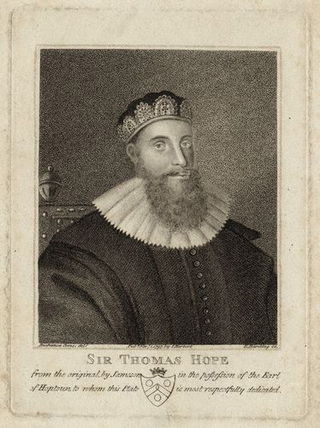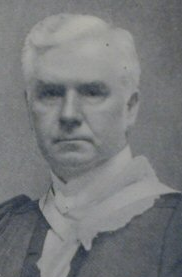Related Research Articles

The Free Church of Scotland is a Scottish denomination which was formed in 1843 by a large withdrawal from the established Church of Scotland in a schism known as the Disruption of 1843. In 1900, the vast majority of the Free Church of Scotland joined with the United Presbyterian Church of Scotland to form the United Free Church of Scotland. In 1904, the House of Lords judged that the constitutional minority that did not enter the 1900 union were entitled to the whole of the church's patrimony, the Free Church of Scotland acquiesced in the division of those assets, between itself and those who had entered the union, by a Royal Commission in 1905. Despite the late founding date, Free Church of Scotland leadership claims an unbroken succession of leaders going all the way back to the Apostles.

Marcus Dods was a Scottish divine and controversial biblical scholar. He was a minister of the Free Church of Scotland. He served as Principal of New College, Edinburgh.
The United Free Church of Scotland is a Scottish Presbyterian denomination formed in 1900 by the union of the United Presbyterian Church of Scotland and the majority of the 19th-century Free Church of Scotland. The majority of the United Free Church of Scotland united with the Church of Scotland in 1929.

The Disruption of 1843, also known as the Great Disruption, was a schism in 1843 in which 450 evangelical ministers broke away from the Church of Scotland to form the Free Church of Scotland. The main conflict was over whether the Church of Scotland or the British Government had the power to control clerical positions and benefits. The Disruption came at the end of a bitter conflict within the Church of Scotland, and had major effects in the church and upon Scottish civic life.

Sir Thomas Hope, 1st Baronet Hope of Craighall (1573–1646) was a Scottish lawyer, and Lord Advocate under Charles I.
The Free Church of Scotland is an evangelical, Calvinist denomination in Scotland. It is the continuation of the original Free Church of Scotland that remained outside the union with the United Presbyterian Church of Scotland in 1900, and remains a distinct Presbyterian denomination in Scotland.

Alexander Moody Stuart was a minister of the Free Church of Scotland. He served as Moderator of the General Assembly to the Free Church of Scotland in 1875.
Continuing churches are Christian denominations that form when a church union between different denominations occurs, and members or congregations do not wish to join the new denomination, but instead choose to continue the heritage and identity of their old denomination. The phrase is sometimes used by denominations that separate from a parent body and wish to express their faithfulness to the denomination's heritage.

The Free Church of Scotland (Continuing) (Scottish Gaelic: An Eaglais Shaor Leantainneach) is a Scottish Presbyterian denomination which was formed in January 2000. It claims to be the true continuation of the Free Church of Scotland, hence its name.
Bannatyne is a Scottish surname. It is also spelt Ballentine, Ballantyne, Ballantine, among others. It may refer to:

Hippolyte Jean Blanc was a Scottish architect. Best known for his church buildings in the Gothic revival style, Blanc was also a keen antiquarian who oversaw meticulously researched restoration projects.

John Craig was a Reformer, and colleague of John Knox. Originally a Dominican, he became a Church of Scotland minister with significant extra responsibilities and played an influential part in the Scottish Reformation.

John Campbell White, 1st Baron Overtoun, was a Scottish chemical manufacturer, supporter of religious causes, philanthropist and Liberal politician. He was raised to the peerage by Gladstone in 1893, and in 1905 was granted the Freedom of the City of Rutherglen, following being honoured in the same fashion by Dumbarton two years earlier, in recognition of his philanthropic endeavours.
Events from the year 1904 in Scotland.
Events from the year 1835 in Scotland.
John Murray Mitchell was a Scottish missionary and orientalist who worked in his country of birth, India and France.
Colin Archibald Bannatyne (1849–1920) was a Scottish minister who twice served as Moderator of the General Assembly of the Free Church of Scotland both in 1900/1901 and 1906/1907.

Walter Ross Taylor (1838–1907) was a Scottish minister of the Free Church of Scotland who served as Moderator of the General Assembly in the critical year of Union in 1900. From 1900 he led the United Free Church of Scotland with its Moderator Rev Robert Rainy.
Alexander Low, Lord Low (1845–1910) was a Scottish lawyer and judge who served as a Senator of the College of Justice.

The Highland Church was a Gaelic-speaking congregation of the Church of Scotland, based in Tollcross, Edinburgh. Formed by the union of St Oran's Church and St Columba's Gaelic Church in 1948, the congregation continued united with Tolbooth St John's in 1956.
References
Cameron, N. et al. (eds) Dictionary of Scottish Church History and Theology, Edinburgh T&T Clark 1993; Cranmer, F.A. 'Christian Doctrine and Judicial Review: the Free Church Case Revisited', (2002) 6 Ecclesiastical Law Journal 203–216; Johnston, C. N. [Lord Sands] 'Doctrinal Subscription in the Church of Scotland', (1910) Juridical Review XVII 201–220; Rodger, A.F. [Lord Rodger of Earlsferry] The Courts, the Church and the Constitution: Aspects of the Disruption of 1843, Edinburgh UP 2008 98-104.